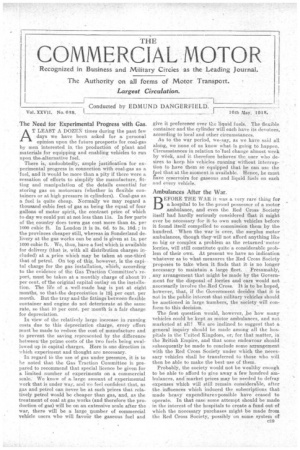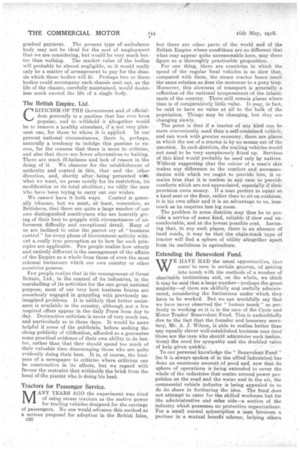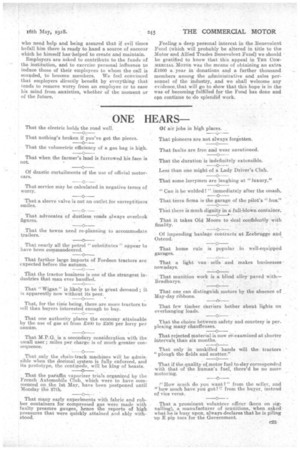. The Need for Experimental Progress with Gas. A T LEAST
Page 1

Page 2

Page 3

If you've noticed an error in this article please click here to report it so we can fix it.
A DOZEN times during the past few days we have been asked for a personal opinion upon the future prospects for coal-gas by men interested in the production of plant and materials for equipping and enabling vehicles to run upon:the-alternative fuel. There is, undoubtedly, ample justification for experimental progress in connection with coal-gas as a 'fuel; and it would be more than a pity if there were a cessation of efforts to simplify the manufacture, fitting and manipulation of . the details essential for storing gas on motorcars (whether in flexible containers or at high pressure in cylinders). Coal-gas as a fuel is quite cheap. Normally we may regard a thousand cubic feet of gas as being the equal of four gallons of motor spirit, the contract price of which to-day we could put at not less than us. In few parts of the country does town gas cost more than 4s. per 1000 cubic ft. In London it is 3s. acl. to as. 10d. ; in the provinces cheaper still, whereas in Sunderland delivery at the gas works can be and is given at is. per 1000 cubic ft. We, thus, have a fuel which is available for delivery (that is, with all distribution charges included) at a price which may be taken at one-third that of petrol. On top of this. however, is the capital charge for the gas installation, wlich, according to the evidence of the Gas Traction Committee's report, must be taken at a monthly charge of about 10 per cent. of the original capital outlay on the installation. The life of a . well-made bag is put at eight months, so that the depreciation is 124 per cent, per month. But the tray and-the fittings between flexible container and engine, do not deteriorate at the same rate, so that 10 per cent, per month is a fair charge
for depreciation. .
In view of the relatively large increase in running costs, due to this depreciation charge, every effort must be made to reduce the cost of manufacture and to prevent the saving represented by the difference between the prime costs of the two fuels being swallowed up in capital charges. Here is one direction in which experiment and thought are necessary.
In regard to the use of gas under pressure, it is to be noted that the Gas Traction Committee is prepared to recommend that special licence be given for a limited number of experiments on a commercial scale. We know of a, large amount of experimental work that is under way, and we feel confident that, as gas and petrol can never be at such prices that relatively petrol would be cheaper than gas, and, as the treatment of coal at gas works (and therefore the production of gas) will be on an extensive scale after the war, there will be a large number of commercial vehicle users who will favoim the gaseous fuel and give it preference' over tt...e liquid. fuels. The flexible container and the cylinder will each have its devotees, according to local and other circumstances.
As to the way period, we-say, as we have said all along, we none of us know what is going to happen. Cireurnstanees in relation to'fuel change almost week by -Week, and it therefore behoves the user Who desires to keep his vehicles running without interruption to have them so equipped that he can use the fuel that..at the moment is available. Hence, he must lave reservoirs for gaseous and liquid fuels on each and every vehicle.
Ambulances After the War. . • EFORE THE WAR it was a very rare thing for a hospital to be the proud possessor of a motor ambulance, and even the Red Cross Society itself had hardly seriously considered that it might ever be necessary for it to own such vehicles before it found itself, compelled to commission them by the hundred. When the war is over the .surplus motor ambulances, though they-will not afford anything like so big or complex a problem as the returned.motor lorries, will still constitute quite a considerable problem of their own. At present we have no indication whatever as to what measures the .Red Cross Society proPoies to take when it finds that it is no longer ai.ecessary to maintain a large fleet. Presumably, any arrangement that might be made by the Government for the disposal of lorries and 'cars would not , necessarily involve the Red Cross. It is to be hoped, however, that, if the Government decides that it is not in the public interest that military vehicles should be auctiOned in large 'numbers, the society ,will conform-to this decision.
The first question would, however, he how many vehicles could be kept as motor ambulances, and not marketed at . We are inclined .to suggest that a general inquiry should be made among all the hogpitals in the United Kingdom, or for. that matter, in the British Empire, and that some endeavour should subsequently be made to conclude some arrangement with the Red Cross Society under which the necessary vehicles shall be transferred to those who will then be able to make the best use of them.
Probably, the society would not be wealthy enough to be able to .afford to give away a few hundred ambulances, and market prices may be needed to defray expenses which will still remain considerable, after the influences which induced the subscriptions that made heavy expendituroapossible have . ceased to operate. In that ease some attempt should be made in the interest of the hospitals to create a fund out of which the necessary purchases might be made from the Red Cross Society, possibly on some system. of gradual payment-. The present type of .ambulance body may not be ideal for the sort of employment that we are considering, but would be very much better than nothing. The market value of the bodies will probably be almost negligible, so it would really only be a matter of arrangement to pay for the chassis which those bodies will fit. Perhaps two or three.. bodies could accompany each chassis sent out, as the life of the chassis, carefully maintained, would doubtless much exceed the life of a single body.
The British Empire, Ltd.
CRITICISM OF THE Government and of officialdom generally is a pastime that has ever been popular, and to withhold it altogether would be to remove a healthy stimulant, if a not very 'pleasant one, for those to whom it is applied. In our present national circumstances, there is, perhaps, naturally a tendency to indulge this pastime to excess, for the reasons that there is more to criticise, and also that there' are fewer alternativesto baiting. There are much ill-balance and lack of reason in the doing of . it. We clamour for the establishment of authority and control in this, that and the Other direction, and, shortly after. being presented with what we want, we press noisily for its restriction, its modification or its total abolition ; we vilify the men who have been trying to carry out our wishes.
We cannot have it both ways. Control is generally irksome, but we must, at least, remember, as • Britishers, that there are quite a large number of our own distinguished countrymen who are honestly giv-. ing of their best to grapple with circumstances of unforeseen difficulty and exceptional detail. Many of us are inclined to raise the parrot cry of " business control" for every phase of Government activity without a. really true perception as to how far such principles are applicable. Few people realize how utterly and entirely different is the management of the affairs of the Empire as a whole from those of even the most colossal businesses which our own country or other countries possess.
Few people realize that in the management of Great Britain, Ltd., in the control of its industries, in the marshalling of its activities for the one great national purpose, most of our very best business brains are ceaselessly engaged in grappling with previously unimagined problems. It is unlikely that better assistance is available in the country, although not a few inspired offers appear in the daily Press from day to . day. Destructive criticism is never of very much use, and particularly so in these days. It would be more helpful if some of the publicists, before seeking the cheap publicity of vilification, afforded as a guarantee some practical evidence of their own ability to do better, rather than that they should spend too much of their valuable time discouraging those who are quite evidently doing their best. It is, of course, ,the business of a newspaper to criticise where criticism can be constructive in its effects, but we regard with favour the restraint that withholds the brick from the head of the pianist who is doing his best.
Tractors for Passenger Service.
MANY YEARS AGO the experiment was tried of using steam tractors as' the motive power for trailing vehicles designed for the carriage of passengers. No one would advance this method as a serious proposal for adoption in the British Isles, c20 but there are other parts of the world and of the British Empire where conditions are so different that what may appear quite unreasonable here, may there figure as athoroughly practicable proposition... For one thing, there are countries in which the speed of the ' regular local vehicles is so slow that, compared with them, the steam tractor bears much the same relation as does the -motorcar to a pony trap. Moreover, this slowness •of transport is generally a reflection of the national temperament of the inhabitants of the country. There still remain places where time is of comparatively little value. It may, in fact, be said to have no value at all to the bulk of the population. Things may be changing, but they are changing 'slowly. , The point is that if a tractor of any kind can be more conveniently used. than a self-contained vehicle, and can work with greater economy, there are places in which the use of a tractor is by no means out of the question. In such distficts, the trailing vehicles would not need to be very sumptuously fitted up. Services of this kind would probably be used only by natives. Without suggesting that the colour of a man's skin makes any difference to the comfort and accommodation with which we ought to provide him, it remains true that it is useless in any case to provide comforts which are not appreciated, especially if their provision costs money. If a man prefers to squat on a hard seat or the floor, rather than to sit on cushions, it is his own affair and it is an advantage to us, inas much aS he requires less leg room.
The problem in some districts may thus be to provide a service of some kind, reliable if slow and uncomfortable, and at the lowest possible cost. Assuming that, in any such places, there is an absence of hard roads, it may be that the chain-track type. of tractor will find a sphere of utility altogether apart from its usefulness in agriculture.
Extending the Benevolent Fund.
WE HAVE HAD the usual opportunities, that come' to men in certain grooves, of gettmg into touch with the methods of a number of charitable institutions and, on the whole, we think it may be said that a large number—perhaps the great majority—of them are skilfully and usefully administered, considering the limitations under which they. have to be worked. But we can truthfully say that we have never observed the "human touch" so perfectly in 'working as it is in the case of the Cycle and Motor Trades' Benevolent Fund. This is undoubtedly due to the fact that the founder and honorary secretarY, Mr. A. S. Wilson is able to realize better than any equally clever well-established business man (and ' those are the men who should administer such institutions) the need for sympathy and the doubled value of help given quickly.
To our personal knowledge the " Benevolent Fund" (as it is always spoken of in the allied industries) has done an enormous amount of good and, now that its sphere of operations is being extended to cover the whole of the industries that centre around power propulsion on the road and the water and in the air, the commercial vehicle industry is being appealed to to do its share in furthering the idea. The fund does not attempt to cater for the skilled workman but for the administrative and sales side—a, section of the industry which possesses no protective organizations. For a small annual subscription a man becomes a partner in a mutual benefit scheme, helping others who need help and being assured that if evil times befall him there is ready to hand a source of succour which he himself has-helpedto create and maintain.
Employers are asked to contribute to the funds of the institution, and to exercise personal influence to induce those of their employees to whom the call is sounded, to become members. We feel convinced that employers directly benefit by everything that tends to remove worry from an employee or to ease his mind from anxieties, whether of the moment or of the future. Feeling a deep personal interest in the Benevolent Fund (which will probably be altered in title to the Motor and Allied Trades Benevolent Fund) we should be gratified to know that this appeal in THE COMMERCIAL MOTOR was the means of obtaining an extra 1000 a year in donations and a further thousand members among the administrative and sales personnel of the industry, and we shall welcome any evidence,that will go to show that this hope is in the was of becoming fulfilled for the Fund has done and can continue to do splendid work.






















